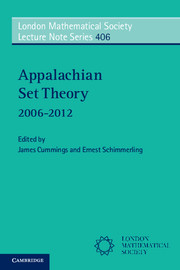Book contents
- Frontmatter
- Contents
- Contributors
- Introduction
- 1 An introduction to ℙmax forcing
- 2 Countable Borel equivalence relations
- 3 Set theory and operator algebras
- 4 A tutorial on Set Mapping Reflection
- 5 An introduction to hyperlinear and sofic groups
- 6 Aronszajn trees and the SCH
- 7 Iterated forcing and the Continuum Hypothesis
- 8 Short extender forcing
- 9 The complexity of classi?cation problems in ergodic theory
- 10 On the strengths and weaknesses of weak squares
- 11 Proper forcing remastered
- 12 Set theory and von Neumann algebras
- 13 The HOD Dichotomy
8 - Short extender forcing
Published online by Cambridge University Press: 05 December 2012
- Frontmatter
- Contents
- Contributors
- Introduction
- 1 An introduction to ℙmax forcing
- 2 Countable Borel equivalence relations
- 3 Set theory and operator algebras
- 4 A tutorial on Set Mapping Reflection
- 5 An introduction to hyperlinear and sofic groups
- 6 Aronszajn trees and the SCH
- 7 Iterated forcing and the Continuum Hypothesis
- 8 Short extender forcing
- 9 The complexity of classi?cation problems in ergodic theory
- 10 On the strengths and weaknesses of weak squares
- 11 Proper forcing remastered
- 12 Set theory and von Neumann algebras
- 13 The HOD Dichotomy
Summary
The eleventh Appalachian Set Theory workshop was held at Carnegie Mellon University on April 3, 2010. The lecturer was Moti Gitik. As a graduate student Spencer Unger assisted in writing this chapter, which is based on the workshop lectures.
Introduction
The goal of these notes is to provide the reader with an introduction to the main ideas of a result due to Gitik [2].
Theorem 1.1 Let 〈κn ∣ n < ω〉 be an increasing sequence with each -strong, and κ =de f supn<ω κn. There is a cardinal preserving forcing extension in which no bounded subsets of κ are added and κω = κ++.
In order to present this result, we approach it by proving some preliminary theorems about different forcings which capture the main ideas in a simpler setting. For the entirety of the notes we work with an increasing sequence of large cardinals 〈κn ∣ n < ω〉 with κ =de f supn<ω κn. The large cardinal hypothesis that we use varies with the forcing. A recurring theme is the idea of a cell. A cell is a simple poset which is designed to be used together with other cells to form a large poset. Each of the forcings that we present has ω-many cells which are put together in a canonical way to make the forcing.
- Type
- Chapter
- Information
- Appalachian Set Theory2006–2012, pp. 245 - 264Publisher: Cambridge University PressPrint publication year: 2012
- 2
- Cited by



